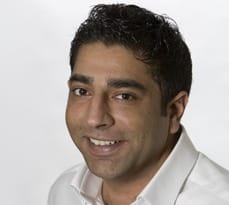
Despite being personal advisor to Spotify founder Daniel Ek, the hugely successful serial investor and entrepreneur Shakil Khan admits he still has a lot to learn.

Rule number one: you don’t know everything. At 16, I thought I knew everything. At 18, I was convinced I knew everything. At 21, I was an expert. At 25, I knew so much that I could tell other people. At 30, I realised I may not know a lot. At 40, I realised I know very, very little. And that’s a very powerful thing, because good leadership is realising that you don’t know everything about everything. Hiring people who are smarter than you is key. You need to find people with specialist experience, the best of the best, and bring them into your team to be your colleagues.
As a child, I refused to be denied. My parents were first-generation immigrants from Pakistan and they were both illiterate. It was a very, very working-class environment. I remember being on the bus and saying to my mum: “That’s a nice house, why don’t we live there?” And my mother, God bless her, who is a wonderful woman and has done the most amazing job bringing us up – said: “People like us don’t live in those houses.” I refused to take that as an answer. I rebelled. I was that six-year-old who wanted to do the paper round like my older brothers. My mother would cry when I finally persuaded my dad and my brothers to let me go out with them at 6am in the winter. My father said: “If you don’t let him go, then he’ll just sneak out of the window.”
Without inner passion you won’t succeed. You can read all the books you like but if you don’t have that inner drive, forget about it. Running a business and being a leader is a painstaking and a tiring process. You need that extra adrenaline, that extra something that spurs you on and keeps you going forward.
Keeping the peace is vital. When you’re hiring exceptional people, there may be some personality challenges. You can’t get emotional about it. It took me many years to learn and embrace the idea of putting yourself in the other person’s shoes.
Lots of would-be entrepreneurs I meet don’t know why they’re doing something. But the “why” is crucial. Is it financial? Is it personal? Are you trying to prove something to yourself? Is it because you think this is a route to vast wealth? Is it because you actually don’t want to take a traditional career path? Or is it that you believe there’s a fundamental problem out there and your knowledge can help solve it? Take Spotify. There was a problem – why was it easier to pirate music than to be able to listen to it legally? The whole purpose was to build something better than piracy.
How we look at age has changed. It used to be that you couldn’t become a senior leader until you got to 40. You’d join a company in the mailroom and work your way up. But everything’s changed and these days the world is more merit-based. The right person gets in, regardless of age. I met Daniel Ek when he was 22 years old. 10 years later he’s running Spotify.
Without risks, you’re just a bureaucracy. Empower your staff to make decisions and mistakes. Give them the responsibility and give them the tools to get the job done. You learn from your mistakes. Take risks in every shape and form. Take risks on people. Take risks in what you’re doing. If you take a risk based on the information, facts and data you have at that time, it may not end up being the right decision. But does it feel like the right thing to do at that moment? If it does, do it. Absolutely.
The two leaders I most admire are Mark Zuckerberg and Li Ka-shing. Mr Li had a very tough childhood and is now one of the world’s wealthiest men. I’m honoured to be an advisor to one of his foundations. He’s got a great philosophy – keep a low profile, do more, talk less. And Zuckerberg has made some very tough but correct decisions. He turned down Yahoo’s offer to buy Facebook for $1 billion. He believed in himself and that what he was building was something way more powerful.
Shakil Khan is currently Head of Special Projects at Spotify, where he is also personal advisor to founder and CEO Daniel Ek. He has mentored individuals with new disruptive technology ventures such as Nick D’Aloisio in his quest to build Summly. He has had a number of online businesses in the UK since 2000, was part of the founding team at buy.at, which was acquired by AOL, and he recently founded CoinDesk, a bitcoin news site. He is an investor in approximately 20 companies including BitPay, Spotify, Top10, Duedil, Yplan and Humin. He is also an advisor to Horizons Ventures, the tech investment arm of the Li Ka-Shing Foundation. Horizons Ventures have invested in a number of well-known tech companies including Facebook, Waze, Deepmind, Siri, Spotify, Hampton Creek, Modern Meadow and Summly.

